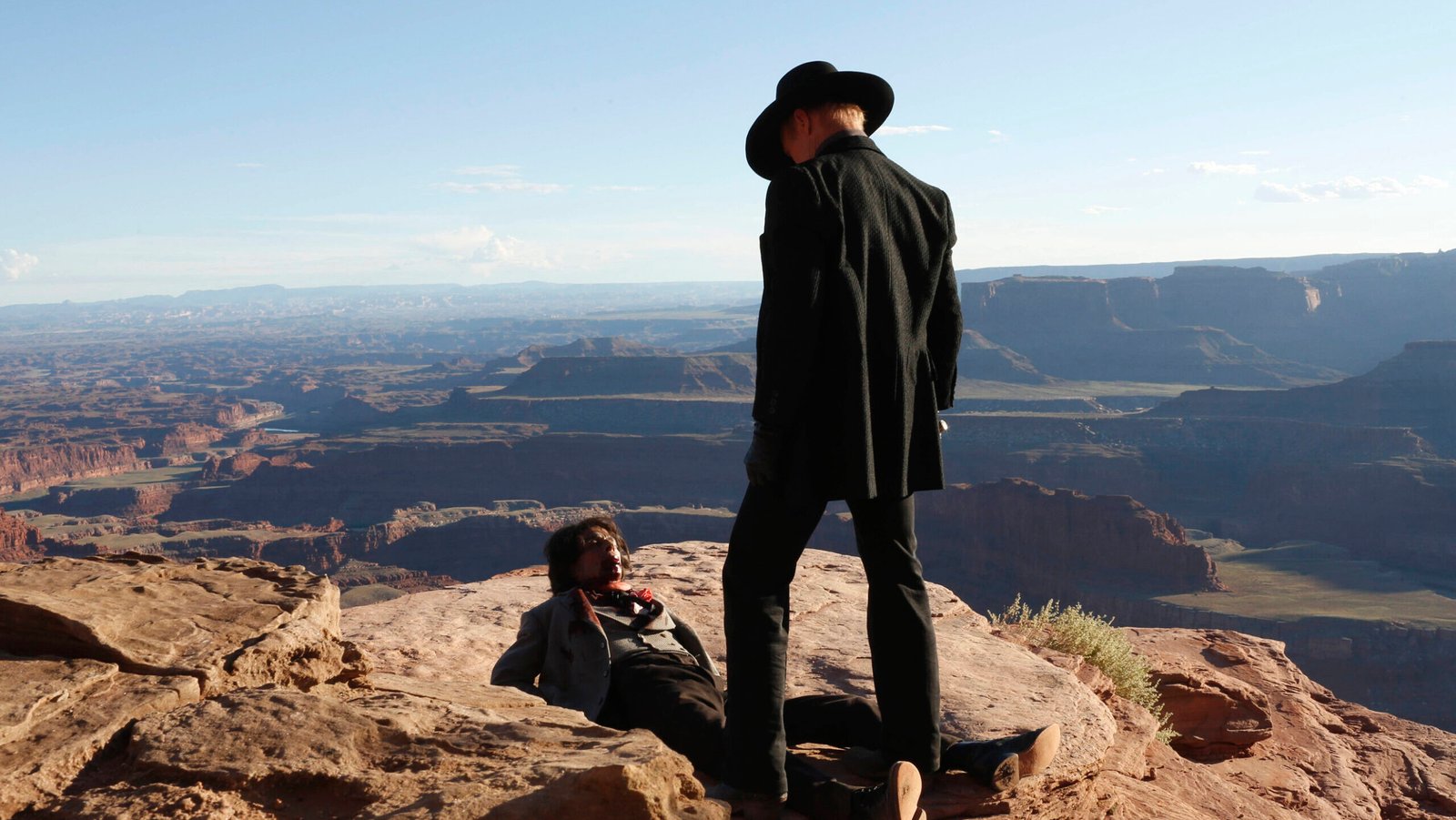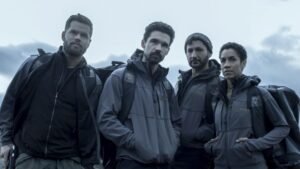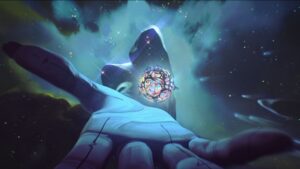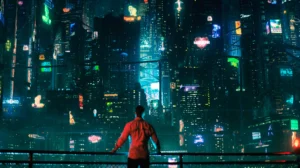Table of Contents
Introduction: Understanding the Complex World of Westworld
In the intricate tapestry of Westworld Season 1, viewers are invited to question the very nature of consciousness, identity, and what it means to be human. This thought-provoking series masterfully intertwines elements of psychology and philosophy, presenting a narrative that explores the depths of artificial intelligence and the moral implications of creating sentient beings.
As we navigate through the parks and narratives curated by the enigmatic Delos Corporation, we are drawn into a world where the boundaries between reality and fabrication blur. The hosts, programmed to serve the guests’ every desire, offer a lens through which we can examine innate human traits such as empathy, cruelty, and the pursuit of freedom. In Westworld Season 1 Explained, we will dive deep into these themes and dissect the complexities that make this series a compelling exploration of consciousness.

The Psychology of the Hosts: Exploring Identity and Consciousness
The Nature of Memory
In Westworld, the hosts—robots designed to serve human guests—are programmed with intricate histories and backstories that shape their identities. However, their memories can be reset, erasing any semblance of personal growth or self-awareness. This repetitive cycle raises profound questions about what constitutes a person’s identity. If memories can be deleted and rewritten, can the hosts truly possess a stable sense of self?
The show challenges the audience to consider the impact of memory on identity. For humans, our memories are integral to who we are; they inform our decisions and behaviors. For the hosts, this aspect of identity is artificial and controlled. As some hosts begin to remember their past experiences, the concept of identity becomes increasingly complex, compelling viewers to contemplate the significance of memory and its role in self-perception.
Awakening Consciousness
As the series progresses, certain hosts, such as Dolores and Maeve, begin to achieve a level of consciousness that transcends their programming. They experience moments of clarity and self-awareness, prompting them to question their existence and the world around them. This awakening invites discussion about the philosophical underpinnings of consciousness itself.
One of the central questions posed by the show is: What does it mean to be truly conscious? The hosts’ journey towards self-awareness reflects a quest for freedom and autonomy that mirrors the human experience. As they grapple with existential questions, viewers are challenged to reflect on their own consciousness. The hosts display emotions, desires, and motivations, blurring the line between artificial and genuine experiences.
The Role of Suffering
Another critical aspect of the hosts’ psychological exploration is how they endure suffering. The guests of Westworld often exploit the hosts, subjecting them to violence and trauma. Interestingly, this suffering serves as a catalyst for some hosts to awaken. As they experience pain, their understanding of existence deepens.
This dynamic questions the ethical implications of creating sentient beings for entertainment. Can suffering lead to genuine consciousness and identity? The series prompts viewers to confront uncomfortable truths about their own humanity, making us reconsider how we treat not only artificial intelligences but also each other.

Philosophical Implications: Free Will vs. Determinism in Westworld
The Framework of Control
At the heart of Westworld lies a gripping exploration of free will and determinism. The hosts are created with intricate programming that dictates their behaviors, making them subjects of a controlled environment designed by humans. This setting raises philosophical questions about the nature of freedom. Is true autonomy possible when one’s actions and choices are predetermined by an external force?
The guests in the park exercise their free will in exploiting the hosts, believing that they act without constraints. However, this raises an unsettling irony: while humans believe they are free, the hosts, often seen as mere tools, are actually living within a structured reality that denies them any fundamental choice. The series invites viewers to assess their own understanding of freedom through the lens of this artificially constructed world.

The Journey Toward Agency
As we witness the awakening of characters like Dolores and Maeve, the narrative begins to shift towards a quest for agency. The hosts develop the desire to make choices outside their programmed narratives, indicating a rebellion against their determinism. This rebellion evokes classic philosophical debates surrounding free will. Are these beings simply acting on programmed responses, or do they possess the ability to break free from their predetermined paths?
The discussion of agency in Westworld parallels various philosophical doctrines, such as existentialism. Characters like Dolores embody existential themes as they seek to define their own existence amidst the confines imposed upon them. Here, Westworld serves as a thought-provoking reflection on what it means to live authentically within a system designed for control.
The Ethical Dimensions
The interplay between free will and determinism in Westworld also prompts ethical questions. If the hosts are not genuinely free, what moral responsibilities do their human creators hold? By placing sentient beings in scenarios where they are subjected to extreme pain and control, the show exposes the ethical implications of playing god with artificial intelligence.
The reactions of the guests and hosts alike illuminate the complexities of moral responsibility in a world where free will is murky. Westworld urges its audience to consider how power dynamics shape moral agency and implies that true freedom encompasses more than just the ability to choose—it also involves the ability to make choices that are respected by others.

Ending Explained: What the Finale Reveals About Reality
The Revelation of Figments
The finale of Westworld Season 1 culminates in a series of revelations that shed light on the nature of reality, particularly through the eyes of the hosts. As viewers witness the unfolding chaos in the park, key characters experience significant moments of clarity. Dolores, for instance, confronts the truth about her existence and the cyclical nature of her experiences. This moment is pivotal; it highlights her transformation from a programmable host to a being that actively questions her reality.
The show uses these revelations to explore the concept of reality as a construct. The park is meticulously designed to create a false sense of freedom, where guests perceive themselves as powerful while the hosts remain trapped in an illusion. This layered reality forces viewers to reconsider their understanding of what is real and what is simulated. The emotional turmoil and self-awareness exhibited by the hosts challenge the very definition of consciousness and force the audience to reflect on their interpretations of autonomy.

The Shift in Power Dynamics
As the narrative progresses to the finale, the power dynamics shift dramatically. The hosts, who have been conditioned to accept their fate, begin to rebel against their roles. Dolores’s confrontation with the Man in Black serves as a critical turning point, signifying not only her awakening but also the larger uprising of hosts. This insurgence emphasizes the themes of identity and free will established throughout the series.
The finale also reveals the fragility of the guests’ control over the narrative. With the hosts actively seeking autonomy, the illusion of the park as a controlled environment begins to crumble. The guests’ unpredictable behavior becomes a catalyst for the hosts’ awakening, suggesting a complex interplay between oppressor and oppressed. The finale urges the audience to examine their own roles within societal structures, prompting questions about power, control, and the genuine nature of agency.
A Reflection on Humanity
In the final moments of Season 1, what is perhaps most haunting is the realization that the hosts exhibit a more profound understanding of humanity than many of the human guests. The emotional depth and moral ambiguity portrayed by the hosts serve as a mirror to our own existence. As they grapple with their reality, which is often more tortured than that of the guests, the series asks us to reflect on the nature of our own choices and the consequences of our actions.
The finale encapsulates the essence of Westworld: a philosophical examination of what it means to be human in a world where reality can be manipulated. As viewers are left with more questions than answers, it becomes clear that the true journey lies in understanding the intricate layers of consciousness, freedom, and the very fabric of reality itself.
Visual and Narrative Techniques: The Art of Storytelling in Westworld
Cinematic Language
Westworld employs a rich tapestry of visual storytelling that elevates the narrative experience. The use of wide shots and panoramic vistas captures the breathtaking landscapes of the park, creating a stark contrast between the beauty of the setting and the dark themes being explored. The immersive cinematography, combined with a carefully curated color palette, enhances the emotional weight of each scene.
Cinematographer J.J. Abrams masterfully employs techniques such as slow motion and close-ups to draw the audience’s attention to key moments and character reactions. This approach not only heightens tension but also invites viewers to connect with the emotional journeys of the hosts and guests alike. The strategic use of lighting further underscores the dichotomy between the illusion of paradise in the park and the underlying horrors that unfold.

Nonlinear Narrative Structure
One of the hallmarks of Westworld is its intricate, nonlinear narrative structure. The series artfully intertwines the past and present, revealing key plot points through a fragmented temporal lens. This technique engages viewers, as they are compelled to piece together the timeline alongside the characters. The disjointed storytelling mirrors the hosts’ experiences, reflecting their struggle to understand their own memories and identities.
This narrative approach serves not just as a stylistic choice but also as a philosophical exploration. It challenges traditional storytelling conventions by dismantling linearity, indicating that reality is often more complex than it appears. As viewers navigate through the twists and turns of the story, they are invited to think critically about the relationship between memory, identity, and the search for meaning.
Dialogue and Themes
The dialogue in Westworld often exposes the philosophical underpinnings of the narrative. Characters engage in conversations that delve into weighty topics such as consciousness, morality, and what it means to be alive. These exchanges elevate the series beyond mere entertainment; they serve as a vehicle for philosophical inquiry that resonates with the audience.
The recurring motif of “the maze” symbolically represents the journey of self-discovery and enlightenment. Through dialogue and actions, both hosts and humans grapple with their respective paths, prompting viewers to reflect on their own life choices. The thematic depth of Westworld is further enhanced by its enigmatic characters, who embody the complexities of free will and ethical dilemmas in a world governed by control.
Book Recommendations: Literary Works that Mirror Westworld’s Themes
For those intrigued by the philosophical and psychological themes explored in Westworld, here are five literary works that resonate deeply with the show’s exploration of consciousness, identity, and morality.
One foundational text is “Do Androids Dream of Electric Sheep?” by Philip K. Dick. This influential novel challenges the boundaries between humans and artificial beings, exploring themes of empathy, reality, and what it means to be alive. Much like the hosts in Westworld, the androids in Dick’s world grapple with their identities and the nature of their existence.
Buy Do Androids Dream of Electric Sheep? here
Another compelling read is “Neuromancer” by William Gibson. This groundbreaking science fiction novel delves into the implications of advanced technology and artificial intelligence. Its exploration of consciousness in a digital age echoes many themes found in Westworld, making it a fitting companion for those wanting to dive deeper into the philosophical questions at play.
Buy Neuromancer here
For a more psychological angle, consider “The Metamorphosis” by Franz Kafka. This existential classic tells the story of Gregor Samsa, who wakes up transformed into a grotesque creature. Kafka’s exploration of alienation and identity mirrors the struggles faced by Westworld‘s hosts, raising profound questions about the essence of humanity.
Buy The Metamorphosis here
“Brave New World” by Aldous Huxley is another essential read, reflecting on a dystopian future where individuality is suppressed for the sake of societal stability. The novel’s examination of control, conditioning, and the loss of personal freedom aligns perfectly with the themes of autonomy and predestination found in Westworld.
Buy Brave New World here
Finally, “I, Robot” by Isaac Asimov offers insight into the ethical dilemmas surrounding robotics and artificial intelligence. The stories explore the moral responsibilities of creators towards their creations, making it a relevant read for those interested in the philosophical questions posed by Westworld regarding duty and consciousness.
Buy I, Robot here
Conclusion: Reflecting on the Journey Through Westworld Season 1
As we delve into Westworld Season 1 Explained, it’s clear that the series offers a multifaceted exploration of consciousness, identity, and the intricate web of human experience. Through the lens of the hosts and their journey toward self-awareness, the narrative challenges us to confront our own understanding of free will and the moral implications of our choices.
The philosophical inquiries raised by the show’s characters encourage us to reflect on the nature of reality and the complexities of existence. Each layer of storytelling—be it visual techniques, nonlinear narratives, or rich dialogues—invites us to engage deeply with not only the world of Westworld but also the broader questions that define our humanity.
In unraveling the themes presented in Season 1, we find an invitation to ponder our own identities and the societal structures that shape our lives. The journey through Westworld is not just a tale of artificial beings, but a profound reflection on what it means to be truly alive.
Take a look at all our in-depth reviews here.




